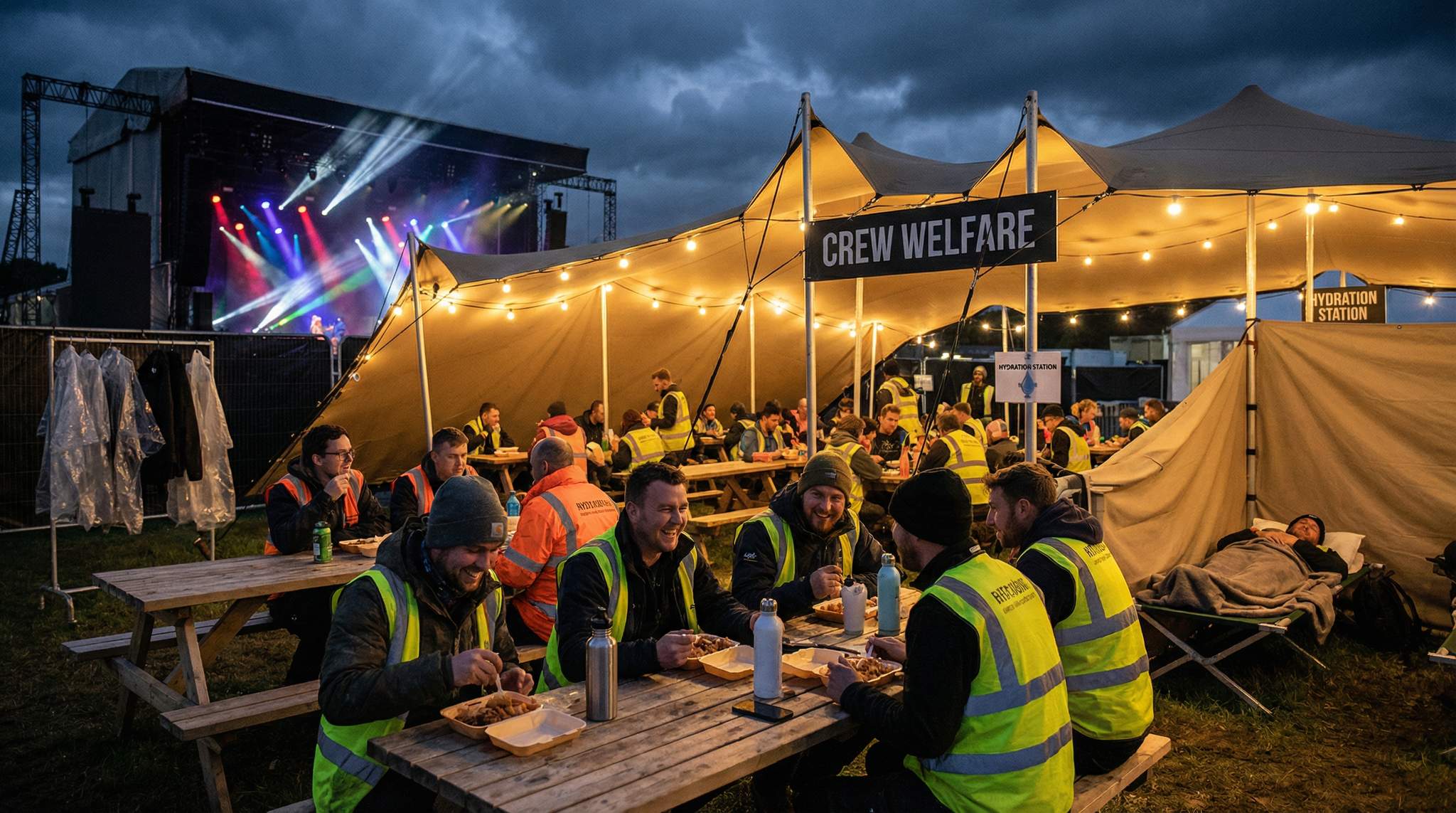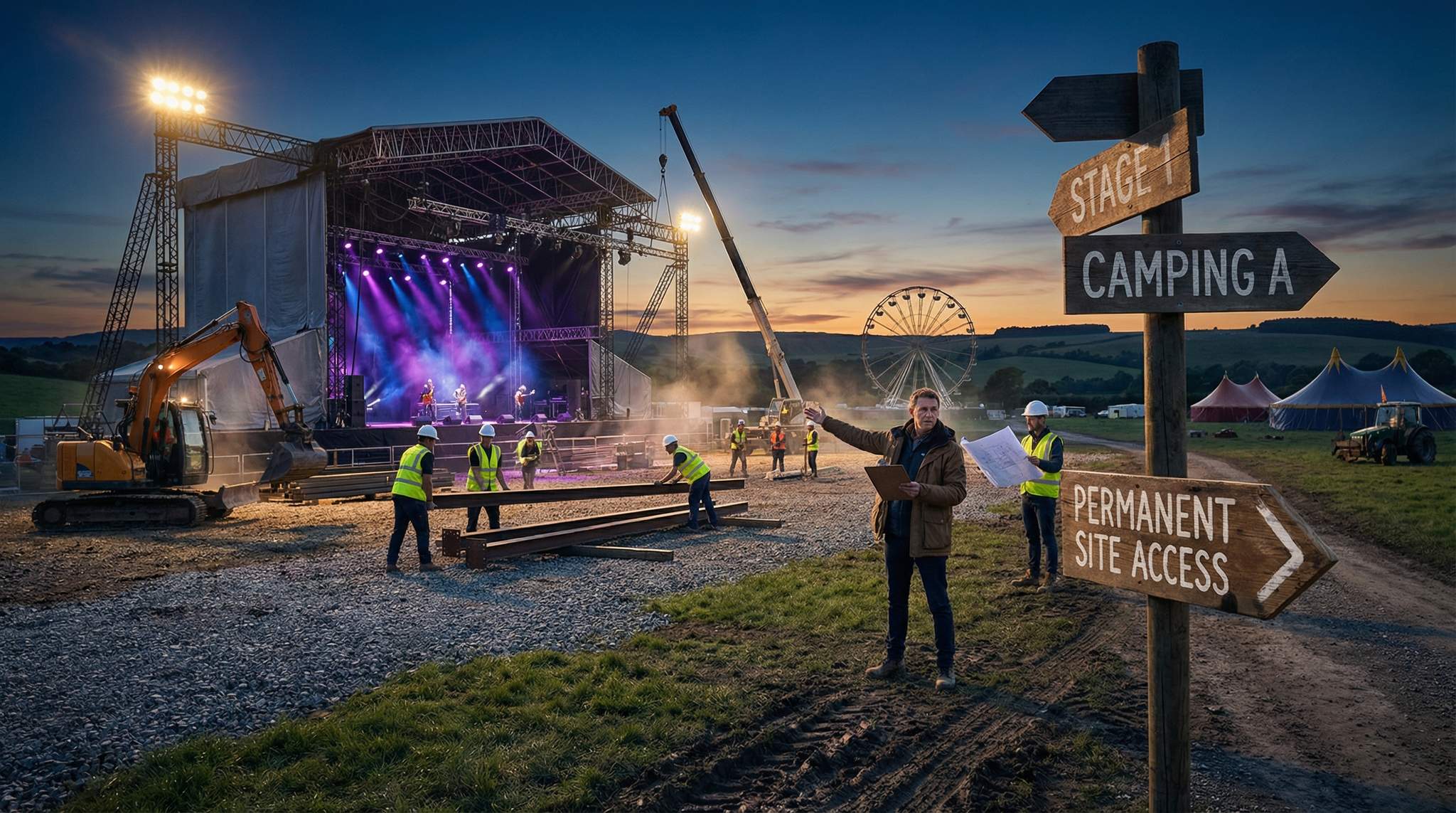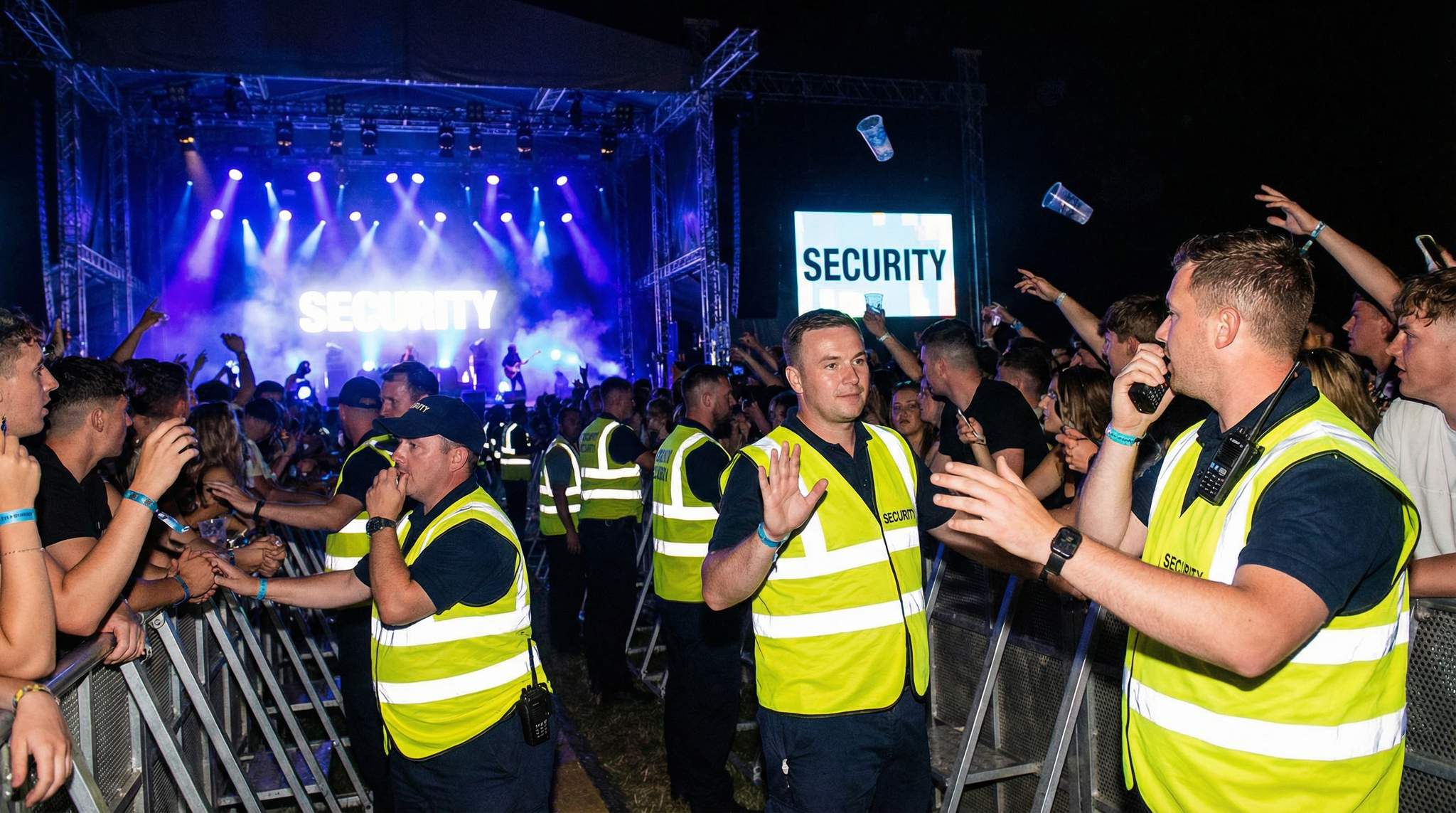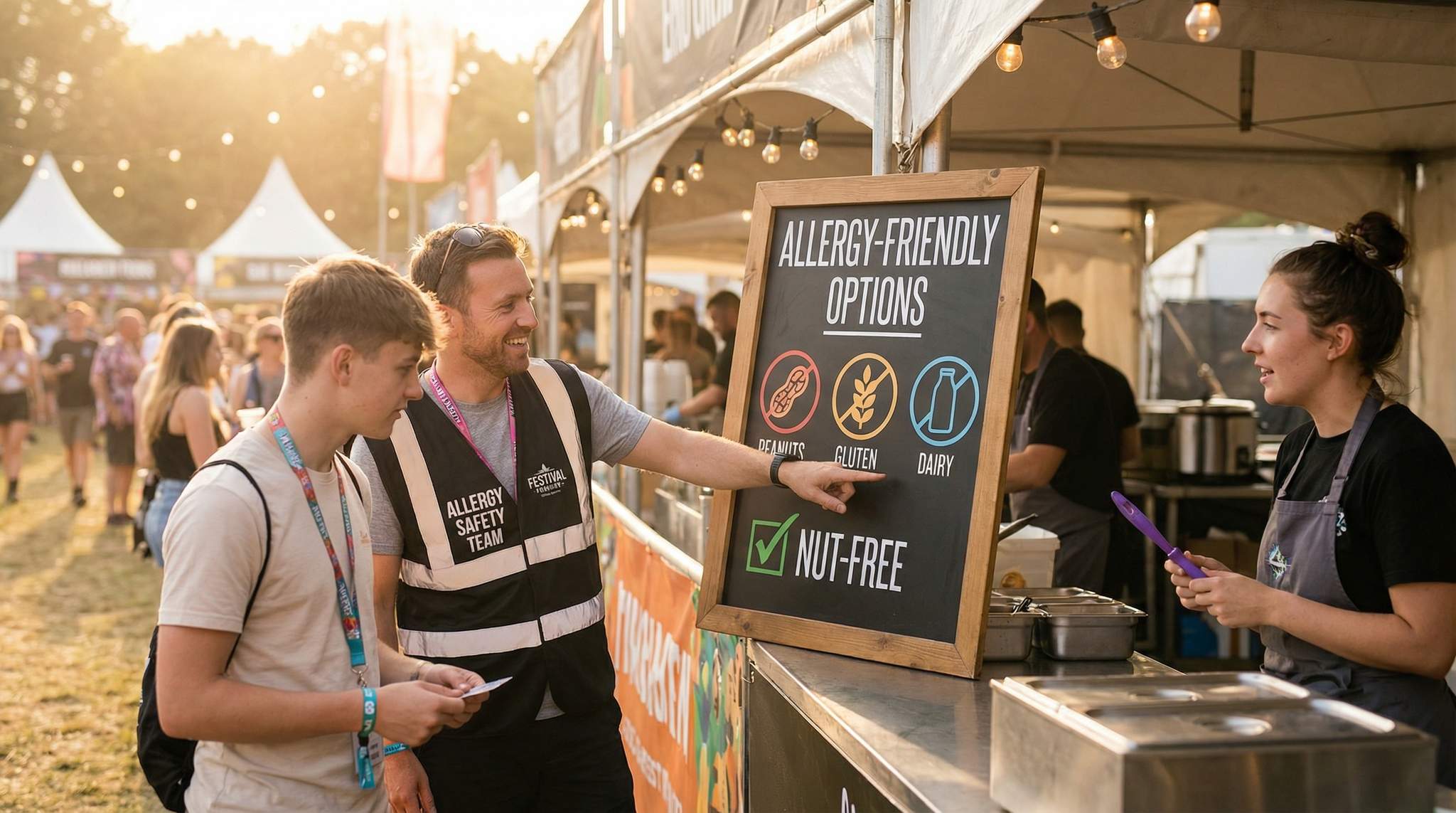Why Crew Welfare Matters
Festival crews are the backbone of any event. These are the people building stages, running sound, managing logistics, and keeping everything on track behind the scenes. Ensuring their basic needs are met isn’t just an act of kindness – it’s a strategic investment in the festival’s success. Healthy, comfortable crew members work more efficiently, stay alert to prevent mistakes, and are more likely to stick around for future events. In short, taking care of the crew leads to smoother operations and a better festival for everyone.
Fuel for the Team: Catering and Meals
Working long hours in a fast-paced festival environment burns a lot of energy. Crew members need real meals, not just snacks, to keep going strong. Seasoned festival organizers always plan to provide adequate food for staff and volunteers, whether through on-site catering or meal vouchers with vendors. For smaller events with tighter budgets, giving out meal vouchers redeemable at food stalls can be a practical solution – it ensures crew can eat without the festival shouldering a full kitchen setup. At larger festivals, a dedicated crew catering tent with hot meals (including options for various diets) becomes a bustling hub where everyone can refuel and recharge.
Consider a case where crew catering was initially overlooked: at a mid-sized music festival, organizers once assumed crew could “just grab something” from public vendors during lulls. The outcome? Many crew members never found time to eat, leading to fatigue and frayed nerves by evening. The following day, management scrambled to arrange free vendor meals and quick buffet trays backstage. Productivity and morale rebounded almost immediately. The lesson is clear: feeding the crew is not optional. Quality meals at regular intervals maintain energy levels, boost morale, and show the team that their well-being is a priority.
Hydration and Snacks: Keeping Energy Up
Alongside meals, water is the single most important provision organizers must make for their crew. Outdoor festivals, especially in summer, put staff at risk of dehydration. Smart organizers place water stations or stock coolers at every crew post – from the stage wings to security checkpoints – so staff can hydrate frequently without leaving their position. Many events distribute reusable water bottles to crew on day one, encouraging constant hydration.
Snacks are the perfect complement to water. Quick, healthy bites like granola bars, fruit, nuts, or sandwiches at crew stations can keep blood sugar stable and moods positive during long stretches between meal breaks. For example, a large food festival in a sprawling venue stationed bins of bananas, trail mix, and energy bars at each information tent and backstage area. Crew members reported feeling more cared for and actually stayed more focused, because they didn’t have to ignore hunger pangs. It’s a simple equation: a hydrated, well-nourished crew stays sharp and avoids the energy crashes that lead to mistakes or accidents.
Rest Areas and Breaks
Festivals often run on tight schedules, but even the most dedicated crew members aren’t machines. Providing a place for staff to take a breather is essential. A crew break tent or rest area gives the team a chance to step away from the noise and crowds, even if just for 10-15 minutes. This area might be a simple canopy with some chairs, shade, and earplugs, or a trailer equipped with cots and a fan – what’s important is that it’s accessible and comfortable.
Planning a Festival?
Ticket Fairy's festival ticketing platform handles multi-day passes, RFID wristbands, and complex festival operations.
At one outdoor festival, the production team noticed their crew would resort to leaning against fences or sitting on the ground whenever they had a spare moment. In response, they set up a small “crew lounge” tent tucked away from the main action, stocked with cold water and seating. The difference was palpable: staff emerged from short breaks more alert and appreciative. Scheduling regular breaks and having a designated rest zone helps prevent burnout, especially during multi-day events. It also sends a message that management sees crew as humans with limits, not just cogs in a machine, which in turn boosts loyalty and respect.
Moreover, plan crew schedules with adequate rotations. No one should be expected to work a 12-hour shift without relief. Stagger shifts so that each team member knows they will get a meal break and a short rest break. This kind of thoughtful scheduling is part of crew welfare too. It’s about balancing the workload so that key positions are always covered while giving individuals time to recover.
Weather-Proofing the Crew
Festivals are at the mercy of weather, and so are the crews that run them. Responsible organizers prepare for all possible weather conditions to keep their staff safe and comfortable. For events under a hot sun, this means making sunscreen freely available at crew check-in and throughout the site. A quick pump of SPF can prevent painful sunburn that would otherwise plague a crew member for the rest of the weekend. Many seasoned festival teams also hand out essentials like brimmed hats or cooling neck wraps on scorching days, knowing that heatstroke is a real threat.
If rain is in the forecast (which any outdoor festival must anticipate), have rain ponchos or waterproof jackets ready for the crew. There’s nothing more demoralizing for staff than shivering in soaked clothes for hours. A stockpile of inexpensive ponchos can literally save the day. In cold weather events, ensure there are warm layers available – think gloves, beanies, or even hot hand warmers for those overnight shifts. One winter holiday festival provided its crew with branded fleece jackets as part of their uniform; not only did it keep everyone warm during late-night breakdowns, but it also served as a badge of pride and a morale boost.
The key is communication: in pre-event briefings, remind crew to come prepared (most will bring their own gear if warned), but also provide backup supplies for those caught off-guard by the elements. Weather can turn in a flash, and being ready shows foresight and care for the team’s welfare.
Health and Wellness Support
Long hours and physical labor can take a toll, especially over a multi-day festival. Forward-thinking producers incorporate wellness support to keep their crew in top form. On-site medical support for crew is a must – that can be as simple as making sure the event’s medics are approachable for staff or having a few basic first aid supplies at crew stations for blisters, minor cuts, or headaches. Encourage crew to speak up if they’re feeling unwell or overly fatigued; a short rest or quick medical check can prevent a small issue from becoming a serious one.
Need Festival Funding?
Get the capital you need to book headliners, secure venues, and scale your festival production.
For multi-day events or very physically demanding festivals, consider offering extra wellness perks. Some events arrange for a volunteer massage therapist or a local sports medicine student to provide 10-minute chair massages during shift changes. It might sound luxurious, but a quick massage or guided stretch can do wonders for someone who has been lifting, running, and standing all day. Likewise, rotate tasks if possible: someone doing heavy manual work one day might do a lighter task the next, giving their body a chance to recover.
Mental wellness is just as important. Festival work can be stressful – problems pop up continuously and crew are under pressure to fix them fast. Maintain a supportive atmosphere where it’s okay for crew to ask for help if overwhelmed. A positive, understanding management approach (like not yelling when things go wrong at 2 AM, for instance) is part of crew welfare too. Some large festivals even have peer support volunteers or a designated “crew welfare manager” whose role is to check in on staff morale and troubleshoot personal needs.
Remember that well-cared-for crew members are far less likely to injure themselves or others. Fatigue and stress can impair judgment; providing ways to alleviate these issues is a direct investment in safety.
The Payoff: Productivity, Loyalty, and Smooth Operations
Taking care of the crew’s basic needs does more than just keep people comfortable in the moment – it has a powerful ripple effect on the entire event. When crew members see that organizers have thought of their meals, water, rest, and health, it builds goodwill and trust. A crew that feels valued will go the extra mile to ensure the festival succeeds. They are more likely to stay late to solve an issue, cover a shift in a pinch, or simply approach their work with a positive attitude. This directly translates to smoother operations and a better experience not just for staff but for artists, vendors, and attendees too.
There’s also a long-term benefit: retention. Festivals often rely on seasonal staff and volunteers year after year. When organizers invest in crew welfare, staff are far more likely to sign up again for the next edition of the event. Over time, this approach builds a veteran crew that knows the event inside out – an invaluable asset. Training new staff every year incurs costs and risks; retaining experienced crew means working with a knowledgeable, loyal team that can train newcomers and uphold the event’s standards.
On the flip side, neglecting crew welfare can result in high turnover, low morale, and even public reputation damage if word gets out. Festivals are a tight-knit industry – if crew are mistreated or find conditions unsatisfactory, others will hear about it. Professional crew members talk to each other and share experiences. No new producer wants a reputation of “that is a horrible festival to work for.”
In short, investing in crew amenities and welfare pays off in every sense. It’s evident in the day-to-day efficiency of operations and in the long run through staff loyalty and a positive festival culture. People perform better when they’re taken care of – it’s that simple.
Budgeting and Logistics for Crew Welfare
Of course, providing all these amenities requires planning. Allocating part of the festival budget to crew welfare is crucial. Think of it as allocating funds to an insurance policy for the event’s success – the returns come in the form of a motivated crew and fewer emergencies. When budgeting, factor in costs for crew meals (or vouchers), water supplies (bottled or refill stations rental), snacks, and any gear like ponchos or sunscreen. Bulk buying and sponsorships can help: many festivals partner with water sponsors or food donors for crew needs.
Logistically, assign a team member or department to manage crew welfare services. For instance, have a “Crew Hospitality Coordinator” whose job is to ensure the catering tent runs on schedule, water coolers stay filled, and break areas remain clean and stocked. This kind of role can coordinate with other departments (like operations, safety, and HR) to respond quickly if any crew need arises. During the event, encourage feedback from crew – if someone notes “we’re running low on water at Stage B,” having a channel to address that immediately is vital.
Also, organizers should integrate crew welfare into the event’s risk management plan. Identify potential risks like heat exhaustion, heavy rain, or overnight fatigue in advance and include mitigations like “extra hydration and shade for crew” or “scheduled rest periods and double staffing for late-night shifts” in the plan. Insurance and compliance come into play here too: in many regions, labor laws and safety regulations require adequate breaks and access to basic facilities for workers. By proactively meeting these standards (and often exceeding them), the festival not only remains compliant with the law but also creates a safer, more resilient event environment.
Frequently Asked Questions
Why is crew welfare important for festival success?
Ensuring crew needs are met is a strategic investment that improves efficiency, safety, and staff retention. Healthy, comfortable crew members work more efficiently, stay alert to prevent mistakes, and are more likely to return for future events. Taking care of the team leads to smoother operations and a better festival experience for everyone.
What are the best ways to provide meals for festival crews?
Organizers should provide adequate food through on-site catering with hot meal options or by issuing meal vouchers redeemable at food vendors. Providing quality meals at regular intervals is essential to maintain energy levels and boost morale. For smaller budgets, vouchers allow crew to eat without requiring a full backstage kitchen setup.
How can festival organizers ensure crew stay hydrated?
Water stations or stocked coolers must be placed at every crew post, from stage wings to security checkpoints, to allow frequent hydration without leaving positions. Distributing reusable water bottles encourages constant drinking. Supplementing water with healthy snacks like fruit and granola bars helps stabilize blood sugar and prevents energy crashes.
Why are designated rest areas necessary for festival staff?
Designated rest areas, such as a crew break tent with shade and seating, allow staff to step away from noise and crowds to recover. Scheduling regular breaks in a quiet zone prevents burnout and fatigue. This helps crew members emerge more alert, focused, and appreciative of management’s care during long shifts.
What weather protection supplies should be provided to festival crews?
Responsible organizers prepare for all conditions by stocking sunscreen and cooling wraps for heat, and rain ponchos or waterproof jackets for wet weather. For cold events, warm layers like gloves, beanies, or hand warmers are essential. Providing these backup supplies ensures safety and prevents morale from dropping due to physical discomfort.
What is the role of a Crew Hospitality Coordinator?
A Crew Hospitality Coordinator manages welfare logistics, ensuring catering tents run on schedule, water coolers remain filled, and break areas stay clean. This dedicated role coordinates with other departments to address needs immediately, such as restocking supplies. Assigning a specific staff member to these tasks ensures crew well-being is consistently prioritized.





